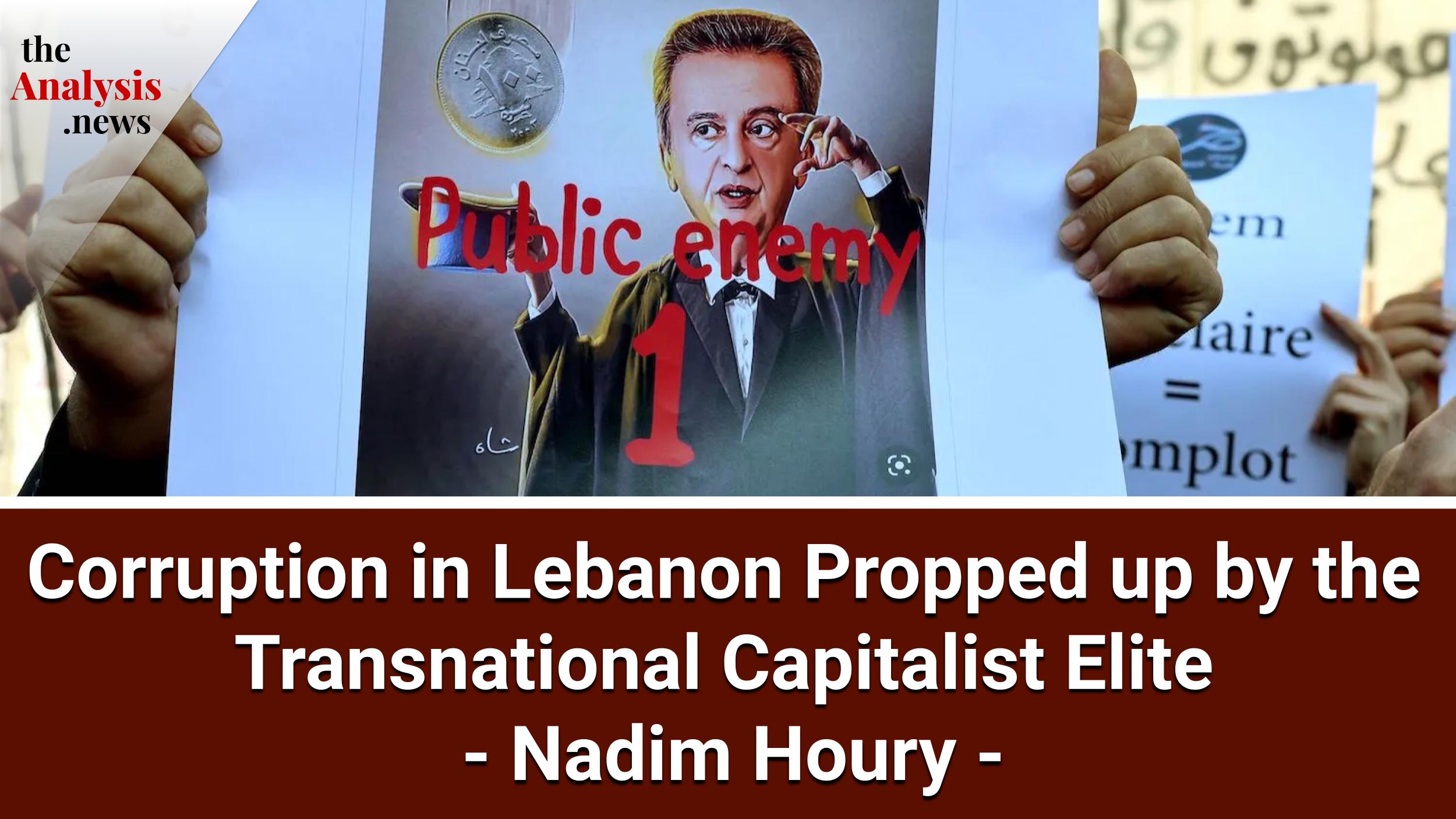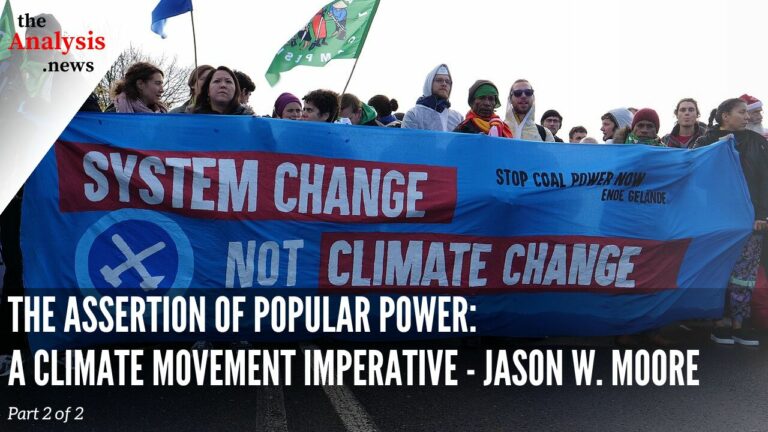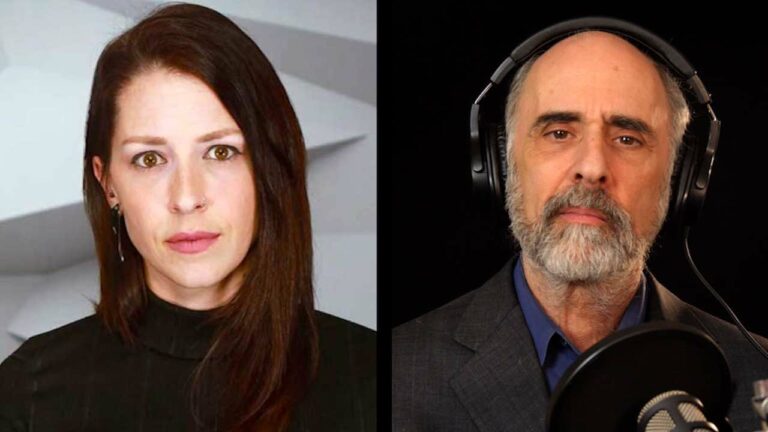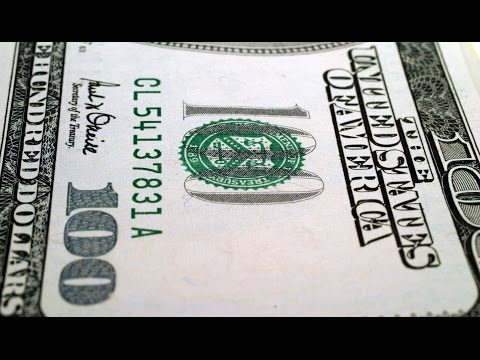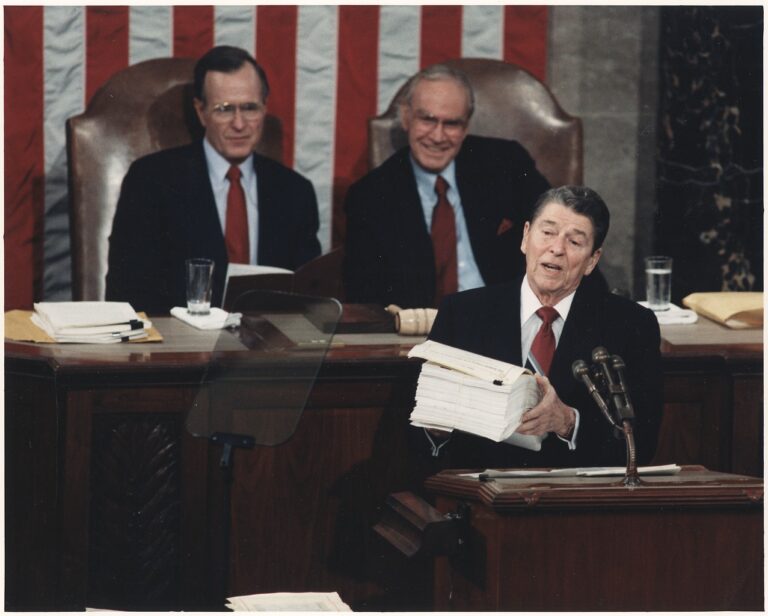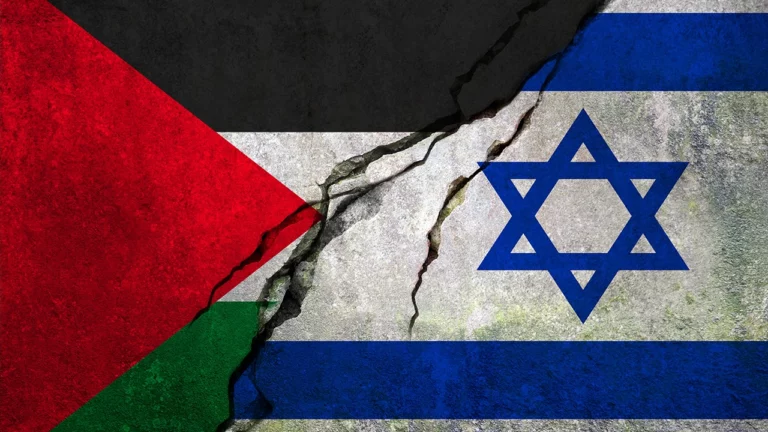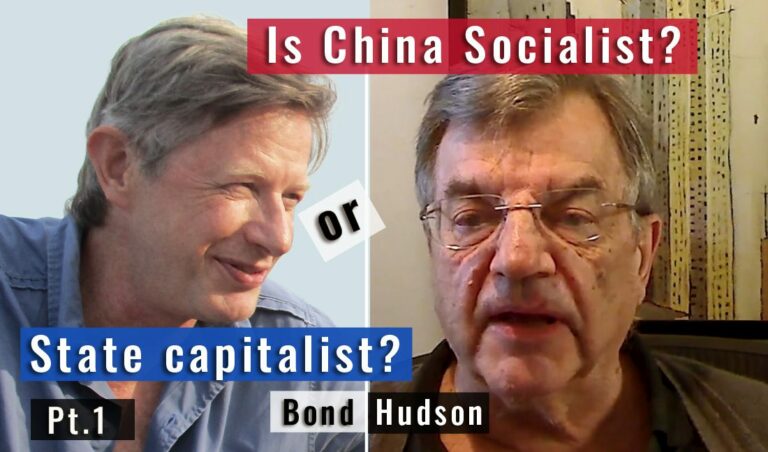Corruption in Lebanon Propped up by the Transnational Capitalist Elite – Nadim Houry
Widespread corruption in Lebanon is fostered by the country’s ruling class, whose business interests are enmeshed with those of international finance. Nadim Houry, executive director of the Arab Reform Initiative, explains how Lebanon’s culture of political impunity is tied to the reconstruction agreements put in place in 1990, at the end of the 15-year civil war. The ongoing political deadlock shields the authorities from scrutiny and allows for vulture capitalists such as the former governor of Lebanon’s Central Bank, Riad Salameh, to embezzle the country’s resources. At the same time, ordinary people are faced with crushing inflation.
Talia Baroncelli
Hi, I’m Talia Baroncelli, and you’re watching theAnalysis.news. Nadim Houry will be joining me today to speak about the Beirut Port blast, as well as the political culture of impunity in Lebanon and the corruption of the political elite there. Before we get started, please don’t hesitate to make a donation to the show by going to our website, theAnalysis.news, and hitting the donate button at the top right corner of the screen. You can get onto our mailing list. Don’t forget to like and subscribe to the show wherever you get your podcasts. You can also head over to YouTube to the channel theAnalysis-news. Like and subscribe and hit the bell; that way, you’re notified every time there’s a new episode. See you in a bit with Nadim Houry.
Joining me now is Nadim Houry. He is the executive director of the Arab Reform Initiative in Paris. He’s originally from Lebanon and worked for Human Rights Watch as a human rights lawyer for 13 years. He’s also the author of the book Without Protection: How the Lebanese Justice System Fails. Thank you so much for joining me today, Nadim.
Nadim Houry
Thank you for having me.
Talia Baroncelli
Three years ago, on August 4, 2020, the Beirut Port blast sent the country reeling. There were 218 people that were killed in the blast. Since then, the families of the people killed have not seen any justice. Why don’t we speak about how this culture of political impunity goes back to the post-Civil War era of 1990 and how it’s entrenched in political sectarianism?
Nadim Houry
Sure, yeah. In August 2020, a massive explosion happened at the Beirut Port. As you mentioned, almost 220 people died, and entire parts of the city were destroyed. It turns out the explosion was caused by nitrate ammonium, which had been stored for years in very dangerous conditions. Even though the authorities knew about it, they had not done anything.
There was a domestic investigation launched because that crime is just too big to ignore. Still, the political class has been obstructing it, and this domestic investigation has been suspended since December 2021.
A very courageous Lebanese Judge, Tarek Bitar, who had issued accusations against a number of key political and security figures in the country, kept getting suspended from doing his investigation. The politicians filed over 25 requests to dismiss Bitar time and time again. Finally, in January of this year, so January 2023, when Bitar tried to resume his investigation, the country’s public prosecutor, Ghassan Oweidat, who himself is actually one of the people that Bitar had charged in the Beirut blast for not doing anything, ended up summoning Judge Bitar for investigation himself, suspended it, and ordered the release of all pretrial suspects.
This is where we are today: a domestic investigation that’s paralyzed and families that don’t have answers. A large number of these families have joined with the Lebanese Civil Society to ask the Human Rights Council if they can do an international fact-finding commission. But as we speak right now, there are no suspects in detention, and the investigation is completely paralyzed.
This pattern of impunity, as you mentioned, is very much grounded in Lebanon’s recent history, particularly the post-war settlement, which created a political culture of the elites and the political elites. Most of them were warlords from the Civil War. With the end of the war, they decided to divide the pie in Lebanon amongst themselves with international backing. This was a deal that had been accepted at the time. Most of them traded their fighting fatigues for fancy suits, and they became the rulers of the country.
Now, what’s interesting is at the end of the Civil War, they passed an amnesty deal. I mention that because I think that is one of the anchors of this culture of impunity that we continue to suffer from. Now, the amnesty deal at the end of the Civil War, so that was 1990, was about crimes committed during the Civil War with a few exceptions. They gave each other a blank check. At the time, the Lebanese society was simply too exhausted and not sufficiently organized to mobilize and overturn this.
Instead of it being a blank check for past crimes, it almost became a blank check for future crimes because now it became this basis of saying, “Well, we never held anyone to account. Why are you going to start with me? Why are you going to do this?” I mentioned it because I think this corruption was very, in my view, directly connected to the explosion of the Beirut Port because no one was being held accountable for anything. Everyone being hired by the state was not accountable to the immediate superior but was accountable to what we call Za’im; these warlords were usually affiliated with various sectarian groups, which made sure people entered public service. The state was their cash cow to buy services distributed in our state to stay in power.
The investigation around the port explosion reveals that no one did anything. Everyone kept waiting for someone else to do it. This has meant that in this culture of impunity, Lebanon has continued to have political assassinations, for instance. Not a single case has been analyzed to this day. Almost to add insult to injury, for some of those who were indicted in the port explosion by Judge Bitar, who’s now been set aside, this investigation has been paralyzed. They ran in the parliamentary elections that were held last year, and some of them regained their seats, even though they’re wanted by a Lebanese judge. Supposedly, they were not arrested because they could not be served. How could they not be served? Because they cannot be found? Yet they’re going around, ran a campaign, and managed to get reelected.
Today, Lebanon is governed and has been governed by a highly corrupt political class that uses sectarian ties to distribute what are state properties. They’re redistributing services to people, but these are services that people paid for in the first place. That’s how they enforce their hold. That’s how they managed to get reelected because, almost like a mafia-like system, they used these services to remind everyone, I exempted you from paying fees on that, so you remember to vote for me. I got your son into the police force; remember to vote for me. I made sure that your violation of the building code was not enforced, so you owe me a favour, and you need to vote for me. It’s really, unfortunately, as simple as that.
Talia Baroncelli
Well, going back to 1990, when the reconstruction efforts were beginning, and you said there was amnesty for these warlords, why do you think that was? I know in the South American or African context, there’s been fighting between different groups. Sometimes, certain factions are not prosecuted because there’s a fear that there won’t be some unity going forward and that there won’t be any functioning power-sharing in the government. Sometimes, that’s a strategic decision not to prosecute some of the warlords who were committing all these crimes. Do you think that was one of the reasons? Or was it pure corruption and incompetence?
Nadim Houry
No, I think you’re right. The formula that ended the Civil War, which these leaders adopted; in Arabic, it’s “La ghaleb, wa la maghloob.” It means no victor, no vanquished. It was based on this idea that everyone committed crimes, as in all the different militias, so we’re not going to put everyone in jail. But that narrative was false. There were civilians. There were people who never carried weapons. But they presented this as saying, “Look, we all just defended ourselves, and so we’re not going to hold anyone accountable.” It was a deal amongst themselves.
You have to remember, in 1990, this was before the Rwanda and Yugoslavia [tribunals], this international recognition that you cannot have these blanket amnesties at the end of wars had not taken root very strongly. The Lebanese War had gone on for very long. The sponsors that ended the war were Saudi and Syria in the lead, but also some international backing. Everyone had been exhausted, even internationally, by the Lebanese Civil War, which had gone on for 15 years.
The narrative that was sold was, “Okay, now the war is over. We’re going to do reconstruction. Everyone’s going to get rich. Don’t ask too many questions about the past. We’ll look towards the future.” It wasn’t just that no one was held accountable. No answers were given—for instance, the families of the estimated 17,000 who disappeared. One could have imagined a system where at least they would have had to say what happened to these people and where they were buried in return, a form of amnesty. No, it was just blanket amnesty, and nothing was done.
In the immediate post-war aftermath, one researcher/academic wrote a book called The Spoils of Truce, T-R-U-C-E. I think it’s great because it describes the system that was put in place at the end of the Civil War. In a way, all these warlords were convinced to put down their weapons because they all had a state and the spoils of truce, and they all became incredibly rich. They divided things amongst themselves. Also, [Rafic] Hariri, the Prime Minister at the time, was in charge of rebuilding.
We can get into details, but basically, they’re really divided up, almost as if it were a private system. For a long time, the Lebanese went with it. Not everyone, obviously, but there was money flowing. There was money from the diaspora; there were investments. Now, we’re paying the price. Maybe we’ll talk about it. Lebanon is in the middle of a massive crisis. The Lebanese fund would stick to the dollar. Every time people, those who were still pushing for accountability, were looked at like, “Oh, you’re just reminding us of the bad old times. Let’s just turn the page.”
Again, ultimately, this deal, this act of amnesty or impunity, was a deal amongst a handful of these warlords. What’s important to note is they managed to have a lot of people buy into it by using the sectarian card. Each leader said, “Look, why would I be prosecuted? I was defending my community. I was defending you.” They presented themselves as the gatekeeper of their community, but they also presented themselves to their community as the essential gateway for this community to access government services.
So even at the public university in Lebanon, which is called the Lebanese University, if you are going to be appointed as a university professor, if you belong to a particular confession, you have to be, in a way, accepted by your appointed leader to get you through. This is not written in any law or any paper. It’s just de facto. They just block each other.
You mentioned that I worked for a long time as a human rights lawyer in Lebanon. We would try to bring a complaint, let’s say, against a particular police officer, not a general, but a police officer, for torture. These complaints would get stuck in the system because even lower-ranking people who’d be accused would immediately see their Za’im, who would intervene and make it stop.
Today, there are six old men, five to six old men, who are still controlling the system. Every now and then, they fight amongst each other, but when there are real demands for structural change over accountability, by miracle, they coalesce together, and they oppose any demands for change.
Talia Baroncelli
Based on what you’re saying, this sectarianism is something that is institutionalized. It’s along religious lines, but these different groups don’t necessarily represent religion. They may represent other political cultures or ties to other countries; I’m thinking of Iran or Saudi Arabia. If I understood correctly, sectarianism was something which began even before the Civil War.
At the end of the Civil War, was there any motion or initiative to perhaps undo that system in search of something better? Or was that not even considered because it would chip away at some of the financial and political gains that these different groups had made?
Nadim Houry
Yeah, that’s a very good question. I would say modern Lebanon, which came into being with its current borders in 1920, is a very small country but incredibly diverse. There are 18 recognized religious communities of various sizes and so forth, and there is an actual geographical reason for this. Lebanon is mostly a mountainous region in one of the oldest parts of the land. Whenever there was a minority, they sought refuge and shelter in these mountains. The model to ensure that all these communities coexisted was called the associational model.
Even at the time of independence in the mid-40s, there was an inter-elite pact that would make sure everyone was represented. Everyone is a minority in Lebanon; everyone is represented. That system worked well for some time, particularly because Lebanon avoided the ’40s, ’50s, ’60s, and ’70s, falling into the trap of authoritarianism that we saw in other Arab countries because the power was diffused amongst different communities.
Clearly, after the Civil War, there were demands. The agreement that ended the Civil War, which is called the Taif Agreement, named after the Saudi City where it was signed, provided a roadmap for starting a process of de-sectarianizing the political system, or at least reducing it. One of the main things was to create a Senate, where in the Senate, the different communities would have their voices so they could have a veto over existential issues. The regular day-to-day politics, what I was describing about the policeman or every seat being assigned, that we would move away from that. This was part of the deal that ended the war, except those who ended the war never implemented it.
Now we’re in 2023, so it’s more than 33 years later, and they haven’t taken a single step to dismantle this system. If anything, what started out back in the early days, even pre-war, a system where, yes, the president is of a certain confession, the prime minister is from one, the speaker is from another, and so forth, certain high-ranking officials, almost like a cancer that metastasized, it started going down the ranks.
So today, I was giving you the example of university professors. They’re going to try to make sure that we have a quota of this many Christians, this many Muslims from this confession, from that confession. The tricky part to explain is this is not that everyone has these blind loyalties, but as a citizen of the state, the day you go to ask to negotiate something, if you want to ask to get a service, the states start treating you like a member of this community. They force you; they corner you into this. There have been movements. There have been movements since the end of the Civil War by Civil Society and others to try to deconfessionalize this.
The latest was in 2019, when there was a massive uprising in the streets where the slogan was, [foreign language 00:19:05]. All means all, in the sense they’re all corrupt, we want to move away from the system. But the system has proven to be incredibly resilient, and we can talk about its resiliency; part of it is linked to its financial power. Again, it’s not just that they keep their power because they can control access to state services. Over the years, they’ve also developed classes of business people who are dependent on them. Your Za’im, your leader, it’s not just that you access public services by requesting their help. Sometimes, you go, and they will try to get you a private sector job through a business person who is close to them. This business person, a private citizen, complies because they’re also benefiting from the connections of the leader, maybe paying less taxes. You see how they’ve dismantled the system in a way that they’ve become the gatekeepers, and it’s become very hard to attack it frontally.
Talia Baroncelli
Well, we’ve seen the devaluation of the Lebanese lira and crazy inflation in Lebanon, as well as footage of people protesting outside of banks and people not being able to withdraw their funds from banks. I think this political corruption that you’re speaking of is clearly represented in the Lebanese Central Bank. The head of the Lebanese Central Bank until, I guess it was July 31st of this current summer, Riad Salameh, was forced to step down because he was being charged with embezzlement, embezzlement of funds. There’s also the OCCRP [Organized Crime and Corruption Reporting Project], which did numerous reports on him being involved with offshore companies that owned, I think, something like $100 million worth of assets around the world, particularly in European real estate markets. It seems like Mr. Salameh is well-connected with the international financial elite. Would you see his corruption as part of a larger transnational capitalist class?
Nadim Houry
Yeah, you’re right. First, we talked about the political and the secretariat pillar of the system, but what I was describing as this post-Civil War order also had a very strong financial component. One of its architects was Riad Salameh. It took us years to understand just how important he was to the system and the legitimacy of the system.
Lebanon’s experience in the ’90s and 2000s, with this process of stabilizing the currency, painting it de facto and bringing in foreign money, most of it from the diaspora, there was a sense of all the countries doing well, it’s wealthy. It’s the way that they bought in a way until the money ran out. It was described as a Ponzi scheme. What’s interesting about the Ponzi scheme was that this wasn’t just the Central Bank. Lebanon had a very developed financial sector. The banking sector was one of its sources of pride historically in terms of the economic model. Then, we all discovered that much of this sector had also become quite corrupt, and its survival depended on the Central Bank and financial engineering by the Central Bank.
The first pillar here is the financial aspect, that’s very much connected to the political quarter. What’s interesting is that this financial class, these elites, were not just constrained. A lot of the money that was flowing into Lebanon was also dirty money from other parts of the region. Also, the Lebanese banking system was very much internationalized.
You gave the example of 2019 when the economic crisis started. Normal depositors had no access to their accounts, none. Even if they needed to get an operation at the hospital. Meanwhile, the top bankers—and this has been proven afterward—top bankers, the top political leaders, managed to get their money. Today, if I try to get $500 out of an account in Lebanon, France, or Switzerland, I will get asked a gazillion questions. How come these billions that made it out of Lebanon, by some estimates, it was $4-$5 billion, and no one asked them questions?
There are clearly a lot of, I would say, connections between a certain Lebanese financial elite and a certain global financial system, which turned for a long, long time a blind eye to Riad Salameh and the other bank. In a way, Riad Salameh, who is today, as you mentioned, has been charged in a number of European countries. He’s had his assets frozen. For many years, he was vetted as a genius, including by international outlets. To this day, there haven’t been sanctions, whether this is for many other political leaders, even though we know that they have assets in the hundreds of millions in Europe, North America, and so forth.
In a way, while there is a real problem in Lebanon with our political and financial elites, they are very much connected, globalized, mingled, and integrated into the financial elite system. They send their children to top Ivy League universities. They wine and dine with the top elites in Europe and so forth. To this day, there are still people in some of these countries that are like Western countries that continue to defend them.
Talia Baroncelli
Yeah, and Germany and France also have arrest warrants out for Mr. Salameh, but I don’t think that he’ll be handed over anytime soon. I’m also wondering, he obviously had numerous funds in European banks and Swiss banks. Do you know of any real efforts to look at some of these banking irregularities and to raise these issues? This shouldn’t all be put on Lebanon. Clearly, European banks are also complicit in propping him up.
Nadim Houry
No, you’re right. There is a pending arrest warrant for him, but Lebanon does not surrender its nationals. He’s staying in Lebanon for now. Interestingly, he was also sanctioned by the U.S., Canada, and the U.K. just a couple of weeks ago. That has also led to the Lebanese Central Bank freezing some of his assets. We’ll have to see if they do it for all these assets. But you’re right, it took a very long time. Hopefully, one day, they’ll ask why they never started earlier to look into some of these sums.
Yes, today, Mr. Salemeh, and again, he’s a very sophisticated player. He has companies and prime real estate in London, Paris, Brussels, and Germany. There are investigations, and many of these assets have been frozen. What will happen to them eventually? We’ll have to see. It took a long, long time. Whether it’s the tip of the iceberg or more, we don’t know. There are assets worth more than $300 million that have been frozen in Europe, some of them in accounts, some of them in real estate, and those relate to Mr. Salameh and close affiliates: his brother, his son, his former lover, also one of his assistants.
Talia Baroncelli
What about the political deadlock or stalemate that has besieged Lebanese politics recently? The Parliament has tried approximately 12 times to appoint a president, and obviously, they weren’t successful. We’ve seen previous elections where people were boycotting the elections as a form of protest. So, where are people’s political allegiances right now?
Nadim Houry
No, you’re right. In terms of the system, in Lebanon, people vote for their members of Parliament, and then the members of Parliament vote for the president. There has to be a quorum to have this. It’s become, again, this idea of splitting the pie between these five or six strong men in the country. Because they’re not agreeing amongst themselves on how to share the pie anymore, they’re ensuring that there is no quorum in Parliament to select the president because they’re still trying to negotiate. The country is parallelized.
Right now, we haven’t had a president for months. The head of the army retires at the end of the year. There is no replacement. There are all sorts of things. Again, they’ve rigged the system in a way where they can parallelize it if they want, and they have because they can’t agree on anything. None of them wants to take responsibility to govern, but they also can’t agree on how to split things. There is less of a cash cow to divide out right now. It’s mostly liability. They’re just waiting.
There’s a domestic issue, but also these divisions within Lebanon, regional and international players to come and have an undue influence. Hezbollah is close to Iran; the Sunni leadership might be close to Saudi. Each one is listening to whatever. At this stage, the main problem is really that the traditional political parties don’t necessarily think in terms of institutions, the constitution, or this is the deadline. They think in terms of the deal. What’s the deal to be had here? How do we protect our interests and their own personal interests? As long as they haven’t found the deal, they are paralyzed again. This is where we are at today.
The scary part is Lebanon is going through what the World Bank has described as one of the worst economic and financial crises of the last 100 years worldwide. You have a ship that’s sinking, but the captains are busy fighting amongst themselves as opposed to focusing on the needed reforms. Again, I see a lot of the big part of the population voted with their feet in the sense that they lead the country; this is how they send remittances back. There were parliamentary elections last year. We saw a number of independent members of Parliament enter, but they were not a clear majority. Even if we had a majority of independent members of Parliament, what I described as the system is a cancer that metastasized in all administrations. Every employee has been appointed. There are still obviously some very honest, hardworking, safe employees, but in each administration, there’s someone blocking things. They’re paralyzing the system. They’re paralyzing the system.
Talia Baroncelli
You mentioned Saudi Arabia, and I just wanted to mention something that happened in 2017 that I was recently reminded of, and that was how the Prime Minister, I think it was Hariri, went to Saudi Arabia and was held up there. He resigned, and then he withdrew his resignation. I think the politics that play out in Lebanon are often representative of a larger ecosystem of Middle East politics in a way.
Nadim Houry
Correct. This was a very troubling, worrying, bizarre turn of events. Saad Hariri also has Saudi citizenship from his father. You’re very right. There’s a dilemma here. Clearly, some of the paralysis in Lebanon is dependent on regional dynamics, particularly now, historically with Israel occupying parts of the South for a very long time, but also in the last 15 years, this rivalry between Saudi and Iran reflects itself in paralysis.
At the same time, and I think as a Lebanese, it’s not just regional powers fault or international powers. We have a political class that is unable. It’s like a game of chicken, and no one is blinking, and meanwhile, the country is paying the price. For me, the main responsibility begins with the current political leadership that we have in the country, a political leadership that was inherited, by and large, from the Civil War and that we, as Lebanese, have not managed to get rid of for various reasons. One of them is their control of so many services. Some of it has to do with the way the electoral laws are, which we can go on and on and describe the reason. The net result is we’re there.
If you ask me, there is a system that came into being at the end of the Civil War. The secretarian system pre-existed the Civil War, but it was made worse by the Civil War. You add to it the form of hypercapitalism, inequality, and foreign intervention. That system went on, and as I mentioned, it wasn’t just political; it had a financial and economic component that generated a lot of inequality. If you ask me my own opinion, I think that system is impossible to resuscitate. It’s still there. It’s still controlled, but it’s no longer able to reinvent itself. We’re in this Gramscian midpoint. The old world is dying, but the new world for Lebanon is finding it hard to be born.
We’re in this interregnum where all the bad things are happening. There’s a lack of governance. This is a country where pretty much everyone relies on private electricity generation because the state only provides about three hours of electricity at best in the country. Even though this is a country of four or five million, this is a country, as you mentioned, whose currency is in freefall and has no president. Yet, those in charge don’t seem to be in a rush to address any of this.
Talia Baroncelli
Well, one final question before you leave. We’ve seen recently fighting in the Palestinian refugee camps in the South of the country, closer to the Israeli border. I think traditionally, the Palestinian refugee camps are run by the Palestinian-ruling elite as well. I think a member of the Fatah party was also killed. Do you see this escalating? Do you think the Lebanese Army might be deployed? Or would it be even possible that Israel would intervene if this gets worse?
Nadim Houry
No, I don’t think so. It happened in Ein el-Hilweh, which is closer to Sidon. It’s not necessarily by the border. You’re right again. The problem with Lebanon is old issues are never dealt with, so they’re just left there. The situation of the Palestinians is a very good example. Lebanon still has a substantial number of Palestinians who were expelled from Israel. Many of those who are today in Lebanon were born in Lebanon, but the Lebanese state does not give them citizenship, so they live in refugee camps. One of the biggest ones is Ein el-Hilweh. The state has no presence inside these camps. As you mentioned, it’s left for governance between Palestinians. From time to time, they erupt into fighting. Now, the timing of this fighting was a bit suspicious. Was someone trying to create more tension? I don’t know. It seems now things have gotten quieter. Usually, the Lebanese Army stays on the outskirts, and there are different mediation efforts and so forth. It looks like, for now, it has quieted.
For me, the broader issue is simply that it’s a bit like you’re building on quicksands in Lebanon. We have all these issues, and instead of actually dealing with them in policies that respect basic rights that actually would give Palestinians their basic rights, but also in return, the state, which is normal for any state, would actually be in charge of providing security, but also education and schooling for these Palestinians, and nothing is dealt with it. The problems accumulate over the years.
Now, we’re starting to see something similar with the Syrian refugees. There are even much larger numbers. The states say it’s not our responsibility, but if you end up being in a country like Lebanon and you have 400,000 Syrian children who are not going to school, ultimately, it will become your problem. This is a taboo in Lebanon. I’m not at all suggesting that somehow they get nationalized in Lebanon. They need to be able to go back to have a safe return to their own country when the conditions are right. What I mean is the absence of good policies makes things worse, and small problems become harder and harder to resolve because the leaders procrastinate on them, not for years, but for decades.
Talia Baroncelli
Well, I think if there are long-standing issues as well, then there have to be different understandings of responsibility. The state can’t just say these kids shouldn’t be here; they should be sent back. I mean, these children will obviously have an effect on the socio-economic conditions of the country, and people have a right to education, and especially children, have a right to schooling. So, it does become something that the state definitely needs to take care of.
Nadim Houry, thank you so much for joining me today to speak about these long-standing socio-political issues in Lebanon and sectarianism. I hope to have you on again, maybe perhaps to discuss the Palestinian issue in Lebanon a bit more next time.
Nadim Houry
Thank you for having me.
Talia Baroncelli
Thank you for watching theAnalysis.news. If you’re able to contribute and make a donation to the show, please go to our website, theAnalysis.news, and hit the donate button at the top right corner of the screen. You can also get onto our mailing list so you’re always updated the next time an episode drops. See you next week.
Podcast: Play in new window | Download
“Nadim Houry is the executive director of the Arab Reform Initiative (ARI). Prior to ARI, Nadim was at Human Rights Watch (HRW) for 13 years, where he started and ran HRW’s Beirut office for a decade before taking on the role of director of HRW’s Terrorism and Counter-terrorism Program. During his time at HRW, he worked across the MENA region, particularly on Lebanon, Syria, Egypt, Iraq, and Jordan, on a range of human rights issues ranging from freedom of expression to abuses by security forces to labor rights. He has conducted extensive research in conflict zones, and his writing often focuses on the themes of governance and accountability. A passionate advocate for change in the region, he has addressed the Security Council and the European Parliament on challenges in the Arab world. A lawyer by training, Nadim worked in the UN as Deputy Counsel for the Volcker Commission, which conducted investigations into allegations of corruption in the Oil-for-Food Program in Iraq and was previously a lawyer.”
